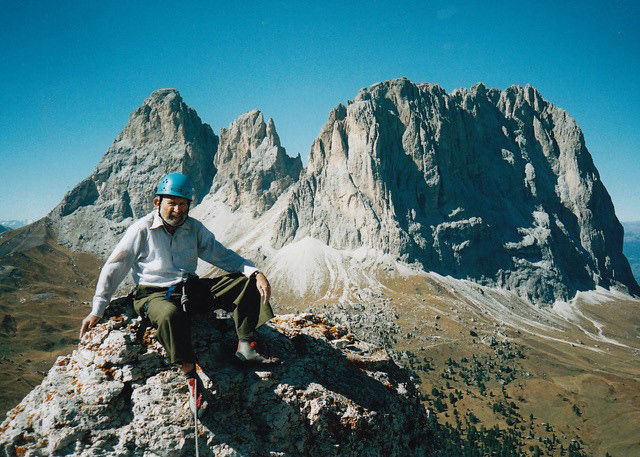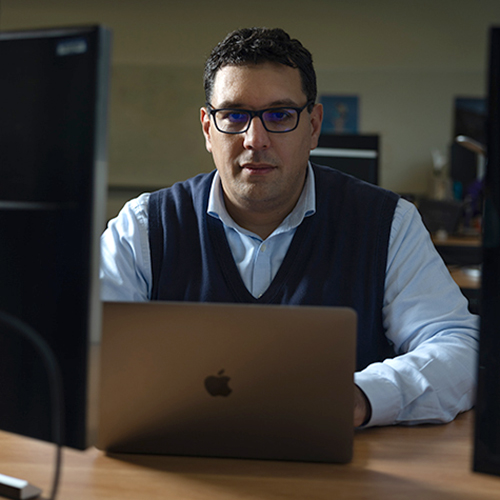
The University of Washington mourns the loss of emeritus professor and founding chair of the Department of Astronomy George Wallerstein.
Through a nearly three-quarter century career Wallerstein made an indelible mark on the department, the University, the academy, and on the many colleagues and students he interacted with. He is remembered for his sense of humor and adventure, equally comfortable scaling mountains as he was studying the skies above them.
A child of German immigrants, Wallerstein grew up in New York City and attended Brown University, graduating with a degree in physics in 1951. He went on to earn an MS and PhD in astronomy from the California Institute of Technology in 1958. After serving in the Navy during the Korean War, Wallerstein joined the faculty at the University of California at Berkeley before arriving at the University of Washington in 1965.
His early research focused on a category of variable stars called Cepheids, but he quickly broadened his research to include many aspects of stellar evolution. He became focused on abundances of chemical elements in stars and how the variations from star-to-star might have been produced, a brand new field at the time.
His body of research was recognized by the American Astronomical Society, which awarded him the 2002 Henry Norris Russell Lectureship on the basis of a lifetime of eminence. He was elected a Fellow of the American Association for the Advancement of Science. He was also elected a Legacy Fellow of the American Astronomical Society in 2020.
Wallerstein was the founding chair of the Department of Astronomy when it was established in 1965 and held that post for 15 years. During his time as chair the department grew rapidly, including the addition of a PhD program, the establishment of partnerships with other universities for research work, and the building of several telescopes and observational facilities. Over the years, a steady stream of Postdoctoral Fellows and post-baccalaureate students started their careers with financial support and mentorship from George.
“I will always remember George for his kindness to students and peers, respect for the work of his local and international colleagues, and his spirit of collegiality that is still his magnificent legacy and enduring gift our department,” reflected Emeritus Professor Bruce Balick.
In 2015, Wallerstein reflected on the 50th anniversary of the Department of Astronomy in a retrospective article in UW’s Columns magazine (p. 38).
“The problem of starting a department is the same as landing an army on a beach,” Wallerstein reflected during the interview. “If you’re going to invade France, you’re going to have to do two things: have the front troops keep advancing—that’s research—and the other is you’ve got to bring in supplies so the army has food and ammunition. For us, it was building faculty and building equipment such as a small telescope.”
Wallerstein and colleague Paul Hodge were the first to arrive at the UW and initiated planning for a new observatory before they’d unpacked their bags. An avid pilot, Wallerstein flew his own plane over different spots and visited half a dozen sites east of the Cascades. He helped establish the Manastash Ridge Observatory near Ellensburg, Washington in 1972. The 30-inch telescope is still used by UW’s undergraduate majors today.

Even as the observatory was being built, Wallerstein knew it was more suitable for student projects than for faculty research. Only a few universities had viable research telescopes due to the prohibitive cost. “It was meant primarily for students, though some faculty used it as well,” he said. “It was used quite a bit by graduate students at first, and now it’s mostly undergraduates.”
Wallerstein married fellow astronomer Julie Lutz in 1998. The couple was committed to diversity and equity. They established the Henry C. McBay fellowship, named after a Morehouse College chemistry faculty member, in 1995 to support research grants for promising scholars at historically Black colleges and universities (HBCUs). They were actively involved in UNCF, helping raise over $4.5 million for scholarships, and received the organization’s President’s Award in 2004 for their efforts. Wallerstein served on the Brown-Tougaloo Advisory Board for many years, and he and his wife recently gave a gift of $4 million to support scholarships at Tougaloo College, a HBCU in Jackson, Mississippi.
Wallerstein was also an avid mountaineer, with many first ascents in California, Alaska, and the Yukon. He organized climbs and extended expeditions, including to places like British Columbia’s Mount McArthur and Pakistan’s K2, where he reached the 17,000-foot advanced basecamp. He was a long-time member of the American and Canadian Mountain Clubs.

Wallerstein had a love of meteorology and, as one colleague put it, “beat the forecasts of the U.S. weather bureau consistently.” His astute predictions drew the attention of colleagues on campus and, during one quarter in the 1980’s, was invited to teach an introductory weather forecasting class in UW’s Department of Atmospheric Sciences. In another Department of Astronomy 50th anniversary tribute, Wallerstein discussed his arrival at the UW and his affinity for meteorology.
In 2015, Wallerstein reflected on life, observation, and the long time horizon that comes with astronomical research:
“Each of us has our favorite [star] that we think will blow up within our lifetime. It’s not likely. One will be correct, but we don’t know whose that is going to be or what star that’s going to be. Sometimes you monitor a star that you think is nearing the supernova stage. In fact I’ve been monitoring one since 1957. Interestingly enough, we have a new faculty member coming who is also interested in that star, and she’s about age 30, so she can monitor it for the next 50 years, and maybe it will blow up for her.”
--
In lieu of flowers, Wallerstein’s family suggests making a contribution to the George Wallerstein Graduate Student Fund in the UW’s Department of Astronomy. A memorial service will be scheduled at a later date.
More Stories

Democracy by the Numbers
Mathematics and Democracy, an undergraduate mathematics course, explores the role of math in many aspects of democracy, from elections to proportional representation.

A Statistician Weighs in on AI
Statistics professor Zaid Harchaoui, working at the intersection of statistics and computing, explores what AI models do well, where they fall short, and why.

The Mystery of Sugar — in Cellular Processes
Nick Riley's chemistry research aims to understand cellular processes involving sugars, which could one day lead to advances in treating a range of diseases.